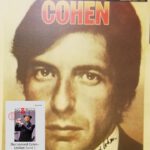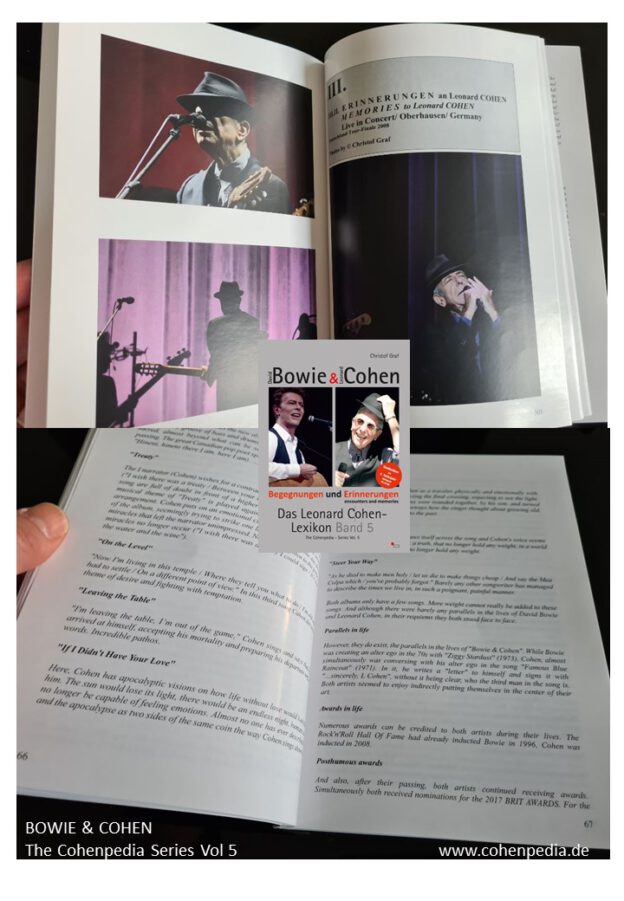

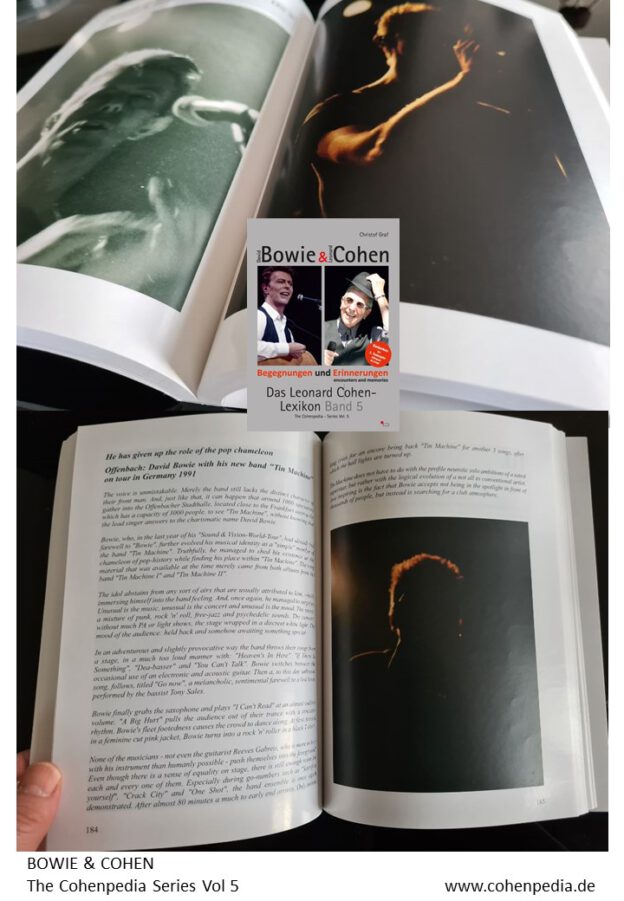
KW-18-2021: #David_BOWIE_and_Leonard_COHEN – Begegnungen und Erinnerungen – encounters & memories – auch im Buchhandel erhältlich
Mehr Infos hier: Infos Das Buch ist erhältlich überall im Buchhandel oder zu bestellen direkt beim Verlag via e-mail: info@cod.de oder via AMAZON
Vol. 5 – David BOWIE & Leonard COHEN – Begegnungen und Erinnerungen – encounters & memories
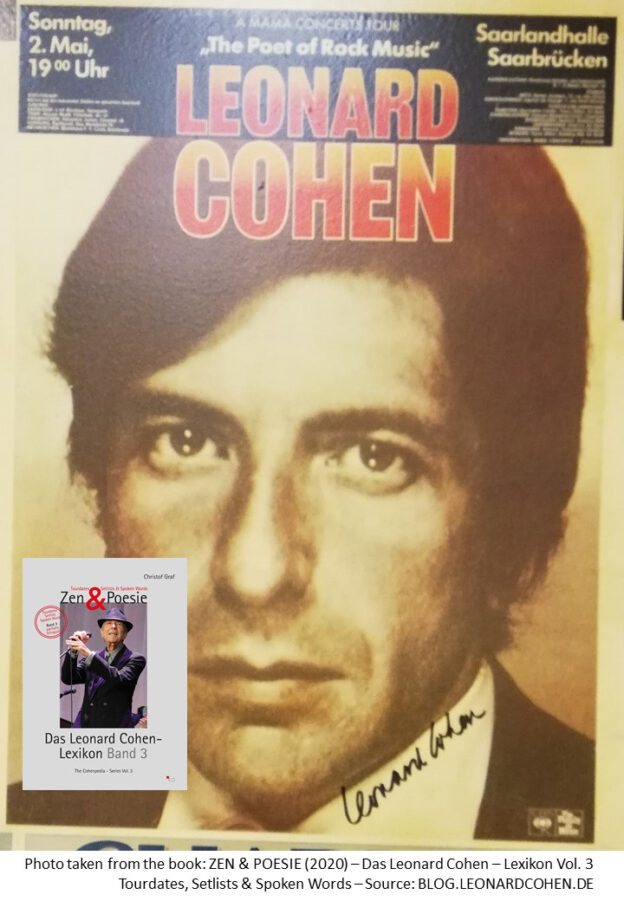
KW-18-2021: #Leonard_Cohen Live in Saarbrücken: 2. Mai 1976 – Gerade einmal 45 Jahre her, aber eine Erinnerung wert :-)
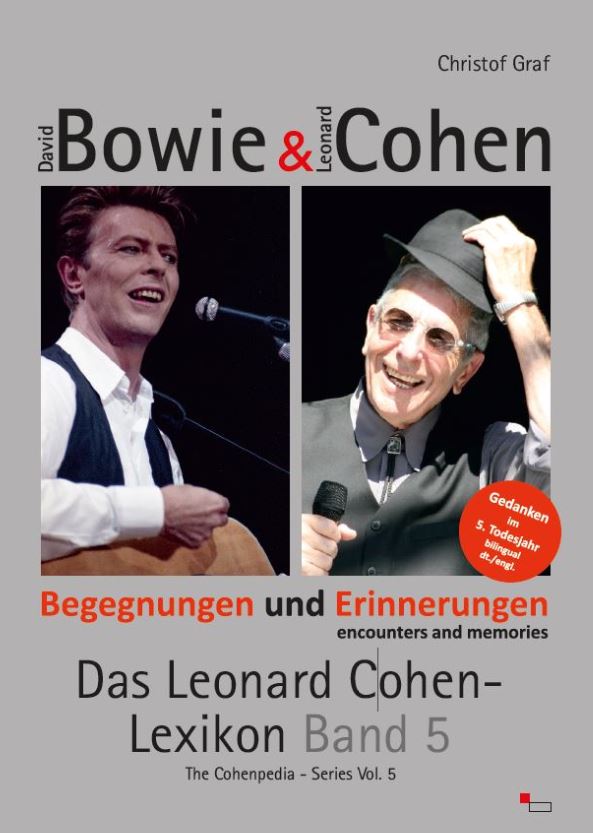
KW-17-2021: #David_BOWIE_und_Leonard_COHEN – Begegnungen und Erinnerungen – Encounters & Memories – Band 5 des „ZEN & POESIE – Leonard Cohen-Lexikons“ „The Cohenpedia Series Vol. 5“ – Bestellungen sind über den Buchhandel, AMAZON aber auch direkt beim COD-Verlag via e-mail möglich: info@cod.de
Mehr Infos hier: Infos Das Buch ist erhältlich überall im Buchhandel oder zu bestellen direkt beim Verlag via e-mail: info@cod.de oder via AMAZON:
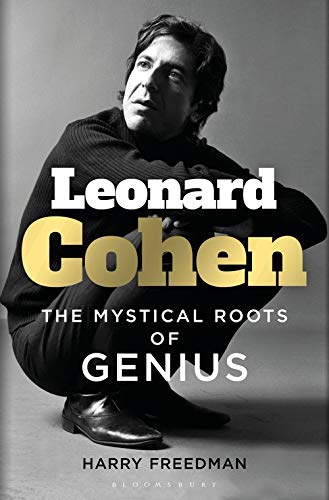
KW-17-2021: Harry Freedman uncovers the spiritual traditions that lie behind Leonard Cohen’s profound and unmistakable lyrics in a soon coming book called: The Mystical Roots of Genius
Harry Freedman uncovers the spiritual traditions that lie behind Leonard Cohen’s profound and unmistakable lyrics
The singer and poet Leonard Cohen was deeply learned in Judaism and Christianity, the spiritual traditions that underpinned his self-identity and the way he made sense of the world. In this book Harry Freedman, a leading author of cultural and religious history, explores the mystical and spiritual sources Cohen drew upon, discusses their original context and the stories and ideas behind them.
Cohen’s music is studded with allusions to Jewish and Christian tradition, to stories and ideas drawn from the Bible, Talmud and Kabbalah. From his 1967 classic ‚Suzanne‘, through masterpieces like ‚Hallelujah‘ and ‚Who by Fire‘, to his final challenge to the divinity, ‚You Want It Darker‘ he drew on spirituality for inspiration and as a tool to create understanding, clarity and beauty.
Born into a prominent and scholarly Jewish family in Montreal, Canada, Cohen originally aspired to become a poet, before turning to song writing and eventually recording his own compositions. Later, he became immersed in Zen Buddhism, moving in 1990 to a Zen monastery on Mount Baldy, California where he remained for some years. He died, with immaculate timing, on the day before Donald Trump was elected in 2016, leaving behind him a legacy that will be felt for generations to come.
Leonard Cohen: The Mystical Roots of Genius looks deeply into the imagination of one of the greatest singers and lyricists of our time, providing a window on the landscape of his soul. Departing from traditional biographical approaches, Freedman explores song by song how Cohen reworked myths and prayers, legends and allegories. By the end the reader will be left with a powerful understanding of Cohen’s story, together with a far broader insight into the mystical origins of his inimitable work.
KW-17-2021: #Everybody_knows , that #Kurt_Cobain `s widow #Courtney_Love performed #Everybody_Knows at the Montreal Leonard Cohen Tribute-Festival „Tower Of Song“ 6th November 2017
KW-17-2021: #Everybody_knows , that the late Glenn Frey from #The_Eagles did a wonderful cover, too . Hier zusammen mit BAD + Don Henley – Everybody Knows – Live at Honors 1996
KW-17-2021: #Everybody_knows, I wish they kept this in the Snyder Cut of the movie Justice League, sung by #Sigrid. For me the song would be worth an Oscar :-)
KW-17-2021: #Everybody_Knows, that this Leonard Cohen-Song was used as a soundtrack for: „Pump up the volume“ with Christian Slater. Also used in an anti smoking add.
Theme from „Pump up the volume“ with Christian Slater. Also used in an anti smoking add.
KW-17-2021: more Infos about #Everybody_Knows by Leonard Cohen: Live on TV 1988 , Live in London 2008 & 2013 in Dublin
1988 Live on KRCW
Everybody Knows ==> Song on
Iʼm Your Man, 1988;
Cohen Live, 1994;
More Best Of, 1997;
Live in London, 2009;
Greatest Hits, 2009, sowie auf der als 2011 nochmals unter dem
„Reclam All Time Best“ veröffentlicht;
Live in Dublin, 2014.
Ein sarkastischer Song mit einer an Disco-Sound erinnernden Pop-Melodie, den Cohen gemeinsam mit der Sängerin Sharon Robinson geschrieben hat. Cohens Stimme ist auf absolutem Tiefstand, und John Bilezikjians Oud kommt am exotischsten rüber. Sicherlich hatte der Song einen Einfluss auf Bob Dylans „Everything Is Broken“, das ein ähnliches Thema hat und im gleichen Jahr geschrieben wurde. Gemeinsam geschrieben von Cohen und Sharon Robinson, eine seiner Background Sängerinnen auf seiner 1979 – 1980er Tournee, stellt „Everybody Knows“ einen Song voll bittersüßem Zynismus dar, wobei Cohens Stimme hier tiefer denn je den Essig liefert, der das von Jennifer Warnes Background-Gesang und der Oud von John Bilezikijan versüßt wird. Durch eine lange Liste dessen was „jeder weiß“, malt Cohen ein trostloses Bild der Gesellschaft („Der alte Black Joe pflückt immer noch die Baumwolle für deine Bänder und Schleifen“). Gleichzeitig ist es eine Art Abbild seines Liebeslebens („Es gab einfach so viele Menschen, die du ohne deine Kleider treffen musstest“). Trotz all der ungeschminkten Verzweiflung hat der Song doch etwas merkwürdig Tröstliches an sich. Anstatt einfach nur auf eloquente Art sein eigenes Unglück zu verzeichnen, wie er es in der Vergangenheit getan haben könnte, schmeichelt Cohen seinem Publikum, indem er ihm den Eindruck vermittelt, dass sie seine schwer erarbeiteten Einsichten mit ihm teilen. „Everybody knows“, singt er, eindeutig sein Publikum mit einschließend und indirekt diejenigen ausschließend, die „unseren“ Standpunkt nicht teilen. Anstatt einfach nur Bericht zu erstatten, nimmt er uns in den Kreis der Eingeweihten auf: „Wir wissen dies, auch wenn die anderen es nicht wissen“, ist die Andeutung, die er damit macht. Der Song ist außerdem auch bemerkenswert, da Cohen zum ersten Mal Keyboard auf der Platte spielt, zweifelsohne eine Widerspiegelung seines neuen Songwriting-Stils.
Auf Cohen-Live ist eine Version von „Everybody knows“ später während des nordamerikanischen Teils der 1993er Tournee aufgenommen worden, und zwar im Orpheum Theatre in Vancouver am 29 Juli. Die Einspielung ist im Allgemeinen der auf „Iʼm Your Man“ sehr ähnlich, obwohl Cohen ein paar geringfügige Änderungen bei der Hauptgesangslinie vorgenommen hat und die Band auf der Bühne härter zu spielen scheint und weniger fließend swingt als im Studio. Die Studioversion bleibt die stimmigere der beiden Versionen des Songs.
(ENGLISH VERSION)
A sarcastic song with a pop melody reminiscent of disco sound, which Cohen co-wrote with singer Sharon Robinson. Cohen’s voice is at an all-time low, and John Bilezikjian’s oud comes across most exotically. Certainly, the song had an impact on Bob Dylan’s „Everything Is Broken“, which has asimilar theme and was written in the same year. Co-written by Cohen and Sharon Robinson, one of his backing singers on his 1979–1980 tour, „Everybody Knows“ is a song fullof bittersweet cynicism, with Cohen’s voice here delivering the vinegar sweetened by Jennifer Warne’s backing vocals and the oud by John Bilezikijan. Through a long list of what „everyone knows,“ Cohen paints a bleak picture of society („The old Black Joe still picks the cotton for your ribbons and bows“). At the same time, it’s a kind of likeness of his love life („There were just so many people you had to meet without your clothes“). Despite all the unvarnished desperation, the song has something strangely comforting about it. Instead of simply experiencing his own misfortune in an eloquent way, as he might have done in the past, Cohen flatters his audience by giving him the impression that they share his hard-earned insights with him. „Everybody knows,“hesings, clearly including his audience and indirectly excluding those who do not share „our“ point of view. Instead of simply reporting, he takes us into the circle of initiates: „We know this, even if the others don’t know,“ is the insinuation he makes with it.
The song is also notable, as Cohen is playing keyboards on the record for the first time, no doubt a reflection of his new songwriting style.
A version of „Everybody knows“ was later recorded during the North American part of the1993 tour at the Orpheum Theatre in Vancouver on July 29. The recording is generallyvery similar to that on“I’m Your Man“, although Cohen has made a few minor changes to the main vocal line and the band seems to play harder on stage and swinglessly than in the studio. The studio version remains the more coherent of the two versions of the song.
2008 Live in London
Live in Dublin 2013

